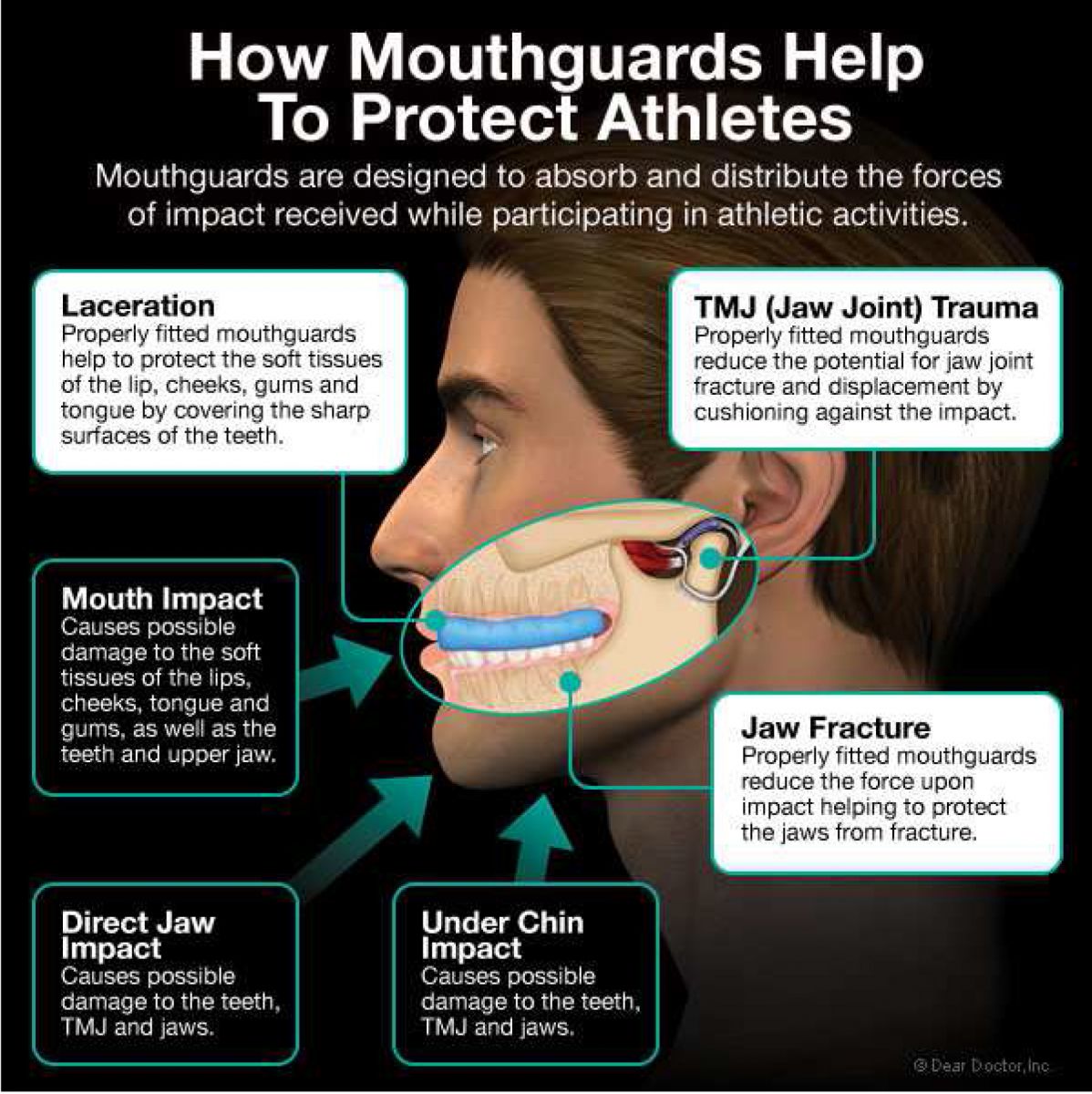
Dental injuries are the most common type of orofacial injury sustained during participation in sports. It is estimated by the American Dental Association that mouthguards prevent approximately 200,000 injuries each year in high school and collegiate football alone. Custom made mouthguards are essential for the prevention of sport-related oral/facial injuries.
In Dr. Raymond Flander’s 1995 study, he reported that in basketball, where mouthguards are not routinely worn, 34% of the injuries were orofacial. Various degrees of injury, from simple contusions and lacerations to avulsions (a tooth being knocked out) and fractured jaws are being reported.
Presently, over 90% of the mouthguards worn are of the variety bought at sporting good stores. The other 10% are of the custom made variety diagnosed and designed by a health professional (dentist and/or athletic trainer).
There are three types of mouthguards presently available. Each type will be discussed.
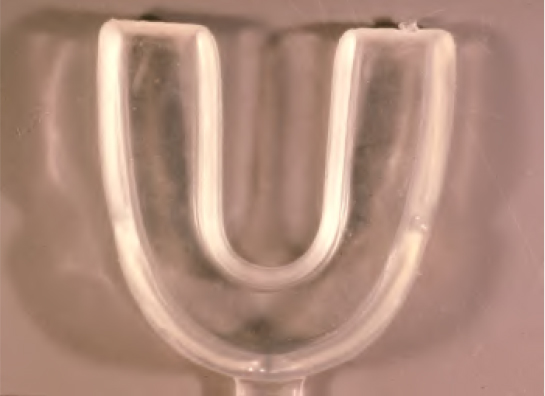 This is an example of a stock mouthguard. They typically come in three sizes. There is no customization of this guard. The athlete must bite into the guard to keep it in place. This will interfere with breathing and speaking. This guard is the least expensive but offers little to no protection to the athlete. It has been suggested and advised in the medical/dental literature that these types of mouthguards not be worn due to their lack of retention and protective properties.
This is an example of a stock mouthguard. They typically come in three sizes. There is no customization of this guard. The athlete must bite into the guard to keep it in place. This will interfere with breathing and speaking. This guard is the least expensive but offers little to no protection to the athlete. It has been suggested and advised in the medical/dental literature that these types of mouthguards not be worn due to their lack of retention and protective properties.
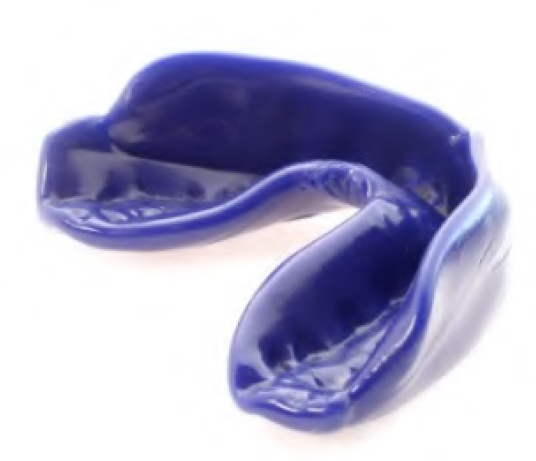 This is an example of a boil and bite. These guards are softened in boiling water and then formed with finger and tongue pressure. There is some customization which will help with initial retention, but this tends to decrease with use. Also, they tend to be thicker in the front and thinner in the back. This mouthguard tends to offer a false sense of security, but will only offer minimal protection. While this guard is slightly better than the stock guard, it is still inferior to the custom option.
This is an example of a boil and bite. These guards are softened in boiling water and then formed with finger and tongue pressure. There is some customization which will help with initial retention, but this tends to decrease with use. Also, they tend to be thicker in the front and thinner in the back. This mouthguard tends to offer a false sense of security, but will only offer minimal protection. While this guard is slightly better than the stock guard, it is still inferior to the custom option.
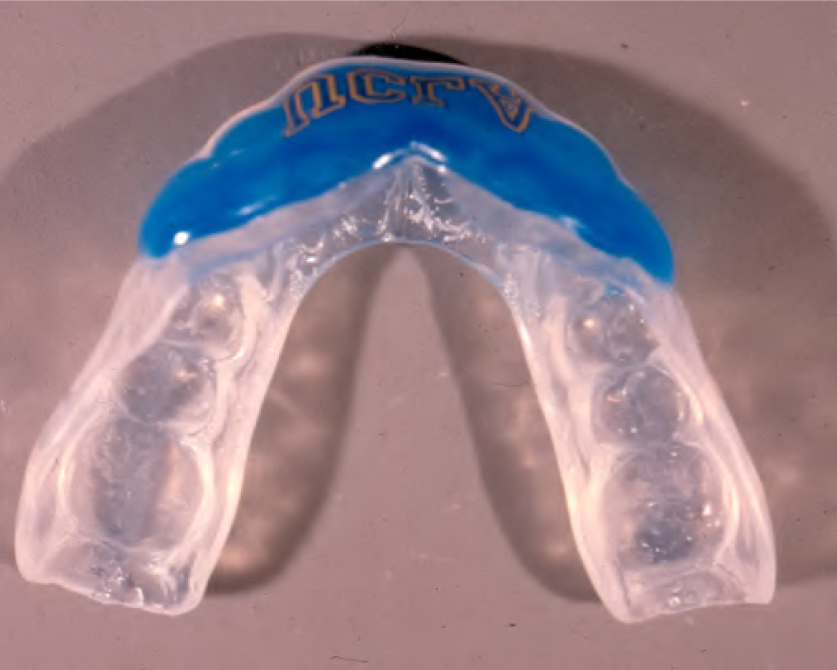
The example pictured above is a fully customized mouthguard. This mouthguard is made with specialized equipment that forms the mouthguard under constant high temperature and pressure to a cast of the athlete’s mouth. This allows an accurate fit and an even thickness of material throughout. Also, the mouthguard will keep its form during it use. The even distribution of the material is key to this guard’s ability to protect the athlete. This mouthguard will not interfere with the athlete’s airway. This allows for comfortable breathing and speaking. This mouthguard offers the most protection against injury.
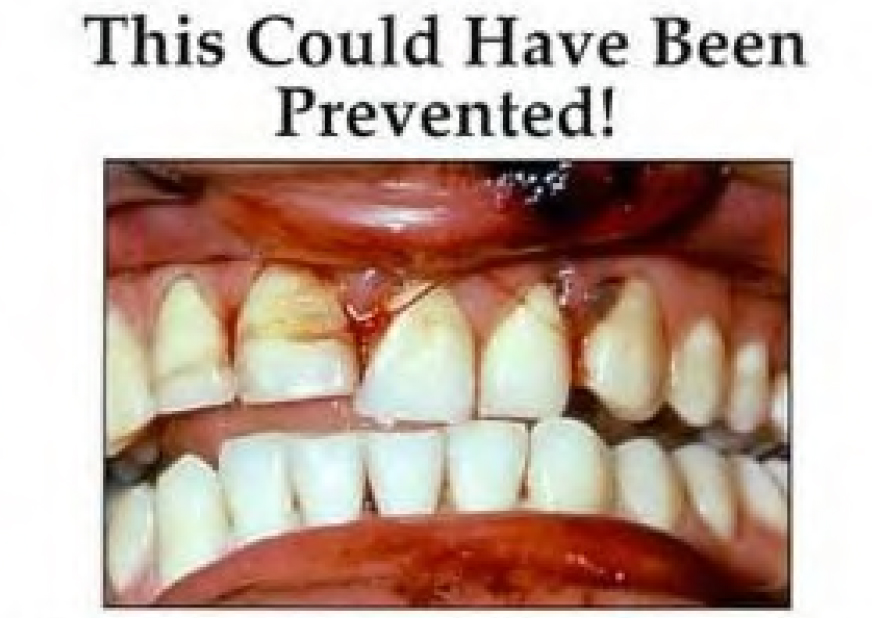
The even thickness is important because as the thickness increases, the transmitted impact force decreases. The mouthguard absorbs the impact force and distributes it evenly to all the teeth and supporting structure. Therefore, no one tooth, area of bone, or joint that takes on the entire force of the impact. There are a few situations that require adjustments that can only be addressed with a custom mouthguard. First, are the younger athletes with teeth that are still erupting. Extra space can be built into the mouthguard to allow for the teeth to continue to erupt. Also, adjustments can be made for those athletes currently in orthodontic treatment. Finally, adjustments can be made for those athletes with a history of previous trauma. Do mouthguards help reduce the risk or severity of a concussion? There have been studies that show a properly formed and fitting mouthguard can reduce the amount of force that is transmitted to the brain from a traumatic blow. This has to do with the distribution of the force of the impact. Also, with the mouthguard in place, the condyle is drawn away from the Glenoid Fossa preventing the force from transmitting to the brain. When the athlete clenches into the custom mouthguard, it will increase head stabilization by tensing the neck muscles. This is still being evaluated and has not been proven. It is important to acknowledge that nothing will stop the brain from impacting the skull from a sudden start/stop movement. One thing that has been proven is that a properly fitted mouthguard can assist in preventing the athlete from being knocked unconscious. So do mouthguards help reduce the risk or severity concussion? It is still being studied. It may help but certainly doesn’t hurt.
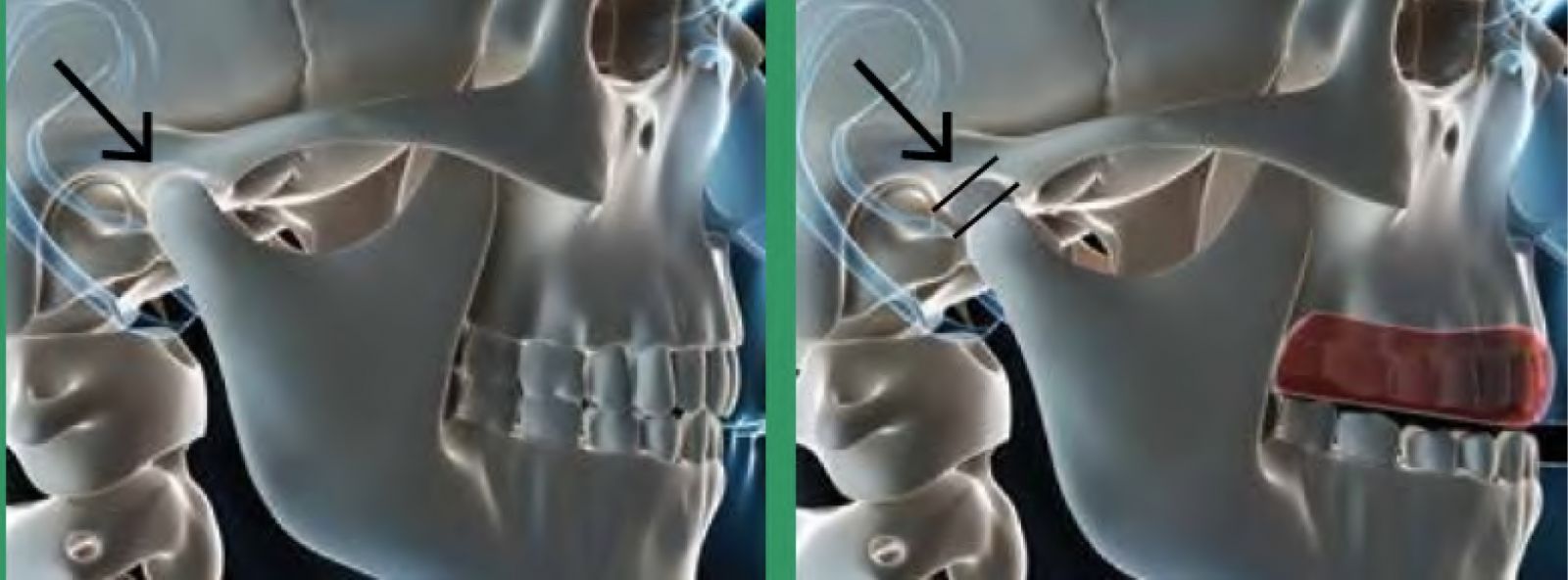
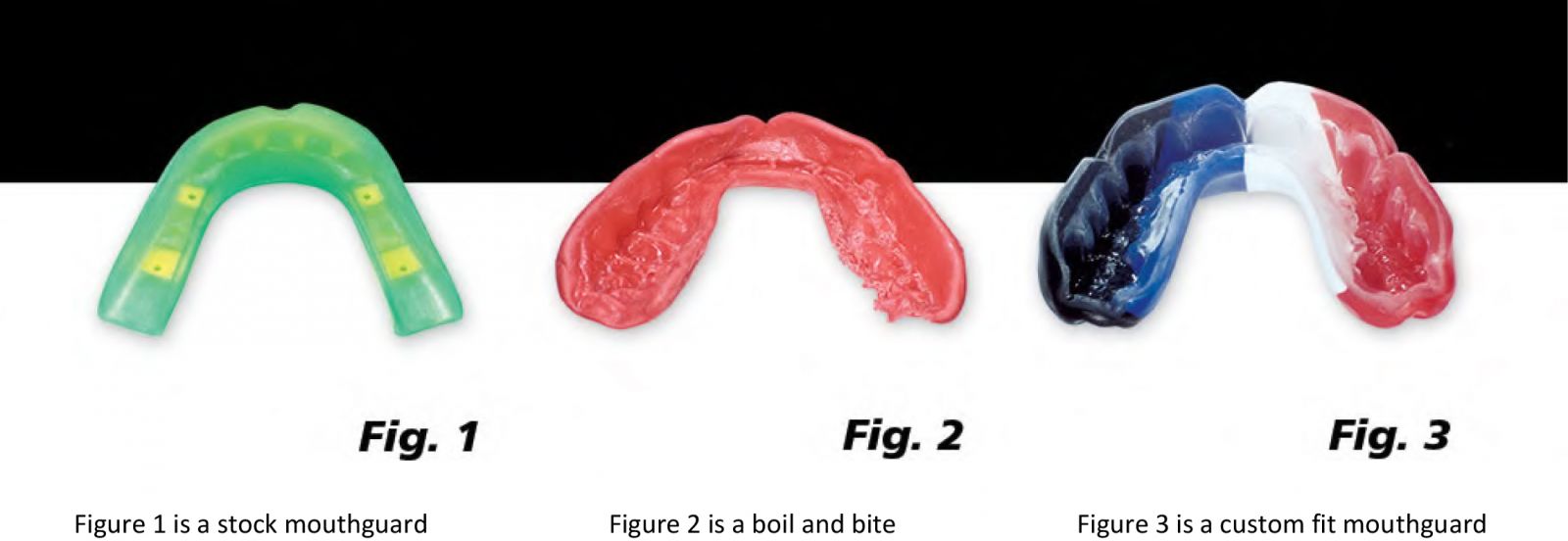
I have seen the cost of these mouthguards range from $200—$500. I would like to offer to help protect your athlete with a custom mouthguard for $75.00. While this is more costly than an over the counter option, the protection is superior. The lifetime cost of replacing a missing tooth can be more than $15,000. You do not have to be a patient of record to take advantage of this offer. If you would like more information please see our website FoxRiverDentalBatavia.com. If you would like to take advantage of this offer, please call to schedule an appointment to have a custom mouthguard fabricated at
(630) 879-0055 or email us at
[email protected] 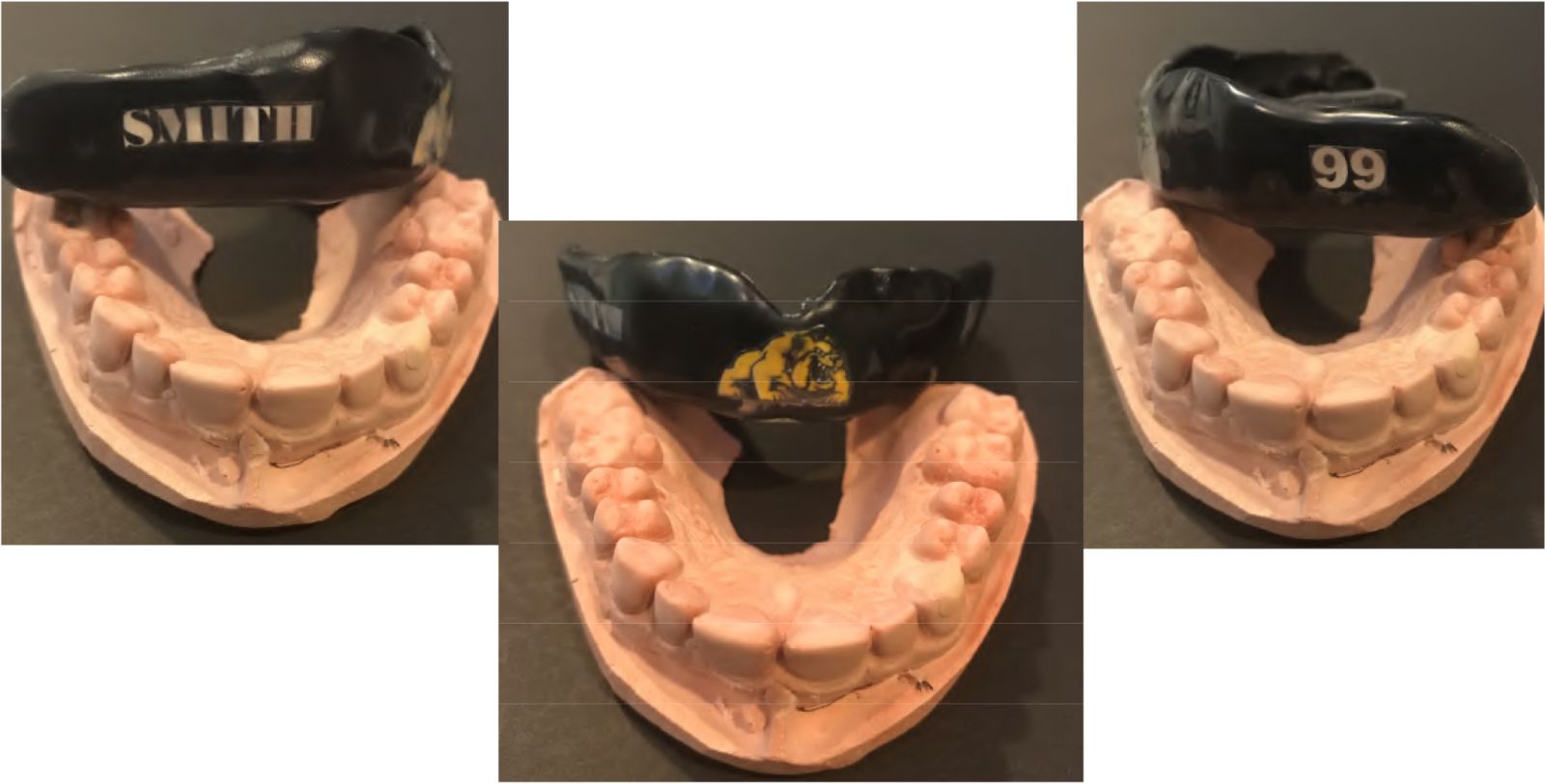
We can customize your mouthguard with team logos and also your athletes' name and number. If you would like to take advantage of this offer click here and send us a message. [email protected]

 This is an example of a stock mouthguard. They typically come in three sizes. There is no customization of this guard. The athlete must bite into the guard to keep it in place. This will interfere with breathing and speaking. This guard is the least expensive but offers little to no protection to the athlete. It has been suggested and advised in the medical/dental literature that these types of mouthguards not be worn due to their lack of retention and protective properties.
This is an example of a stock mouthguard. They typically come in three sizes. There is no customization of this guard. The athlete must bite into the guard to keep it in place. This will interfere with breathing and speaking. This guard is the least expensive but offers little to no protection to the athlete. It has been suggested and advised in the medical/dental literature that these types of mouthguards not be worn due to their lack of retention and protective properties. This is an example of a boil and bite. These guards are softened in boiling water and then formed with finger and tongue pressure. There is some customization which will help with initial retention, but this tends to decrease with use. Also, they tend to be thicker in the front and thinner in the back. This mouthguard tends to offer a false sense of security, but will only offer minimal protection. While this guard is slightly better than the stock guard, it is still inferior to the custom option.
This is an example of a boil and bite. These guards are softened in boiling water and then formed with finger and tongue pressure. There is some customization which will help with initial retention, but this tends to decrease with use. Also, they tend to be thicker in the front and thinner in the back. This mouthguard tends to offer a false sense of security, but will only offer minimal protection. While this guard is slightly better than the stock guard, it is still inferior to the custom option.




